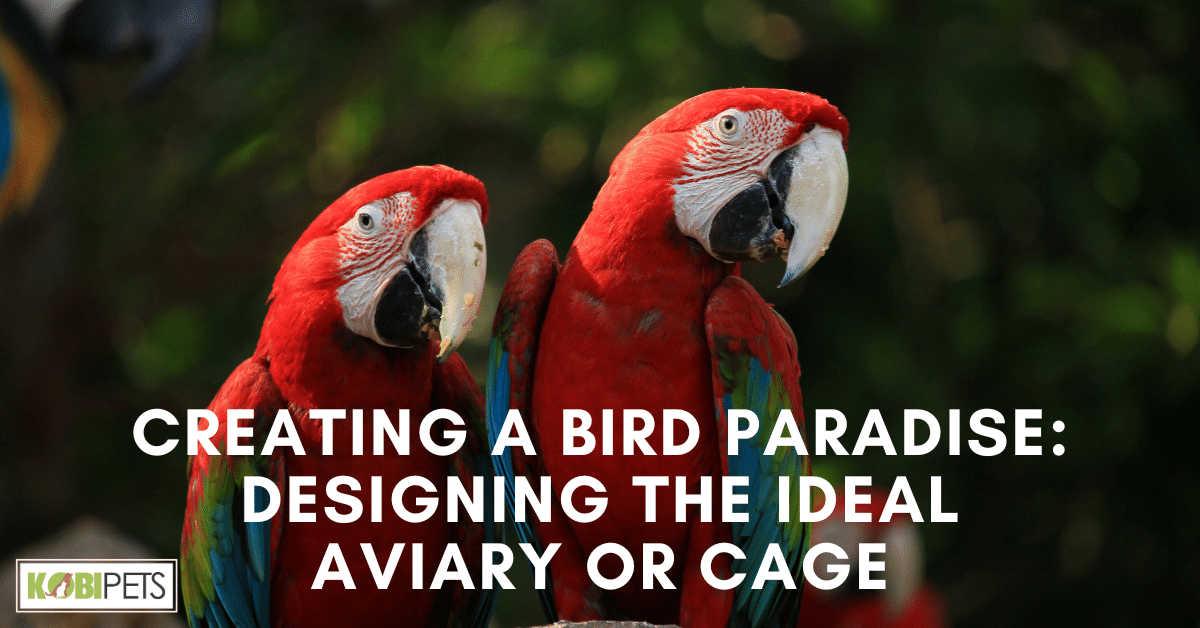
Designing the ideal aviary or cage for your feathered friends is a delightful endeavor. Consider incorporating natural elements like branches, rocks, and foliage to mimic their native habitats, providing both physical and mental stimulation. A well-thought-out aviary not only ensures your birds’ well-being but also creates a captivating paradise for both you and your avian companions to enjoy.
Creating a bird paradise for your feathered friends goes beyond the typical cage setup. It’s about providing them with a comfortable and stimulating living space that mimics their natural habitat. In this article, we’ll explore the importance of designing an aviary or cage that caters to their specific needs and the benefits it brings to your pet birds’ overall well-being.
Understanding Your Bird’s Needs
To provide the optimal living environment for your pet birds, it’s crucial to begin by delving into the unique needs of your feathered companions. Researching and understanding your specific bird species is the foundation of responsible avian care.
Different bird species, whether it’s the lively and talkative parrots, the delicate and melodious finches, or the cheerful canaries, have distinct requirements when it comes to their living spaces. Size matters, but so do temperament and habits. Some birds may thrive in spacious aviaries with room to fly, while others feel more secure in cozy, well-appointed cages.
By considering these factors, you can ensure that your pet birds not only survive but thrive in an environment tailored to their individual needs, fostering their physical and emotional well-being.
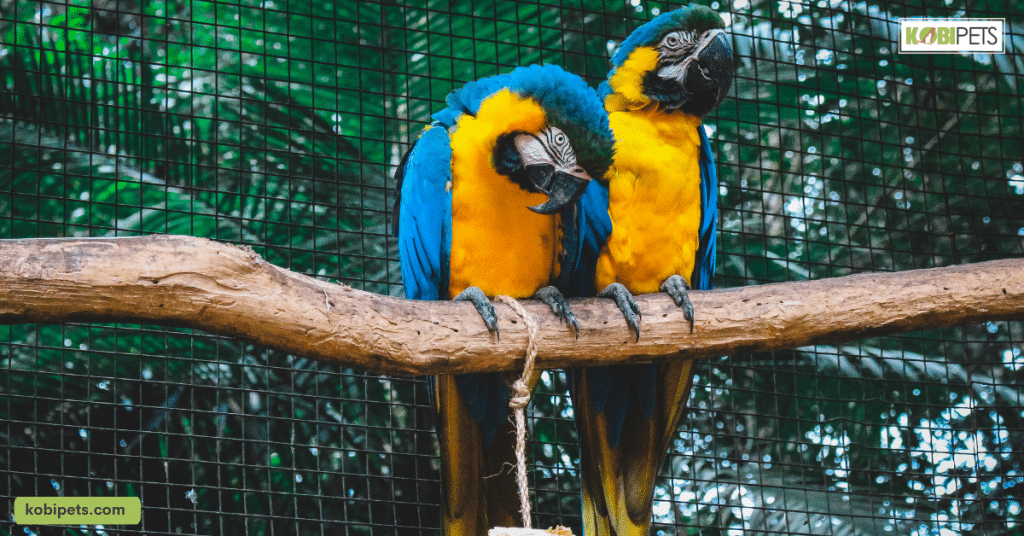
Choosing the Right Location
When it comes to creating the perfect haven for your pet birds, choosing the right location is paramount. Your birds’ health and happiness are intricately tied to where you place their aviary or cage. In this section, we’ll explore the nuances of location selection, outlining the benefits of both indoor and outdoor setups, while offering valuable tips to ensure your feathered companions thrive in their chosen space.
Indoor Serenity
Indoor aviaries offer a controlled environment, shielding your birds from extreme weather conditions and potential predators. The consistent temperature and protection from the elements can greatly benefit their well-being. However, adequate ventilation and natural light are essential to simulate their natural habitat.
Adequate ventilation is crucial for maintaining air quality and simulating the natural airflow birds would experience in the wild. Providing ample natural light is equally important. Positioning the aviary near windows or using full-spectrum lighting can mimic the sunlight they’d receive outdoors, promoting their overall health.
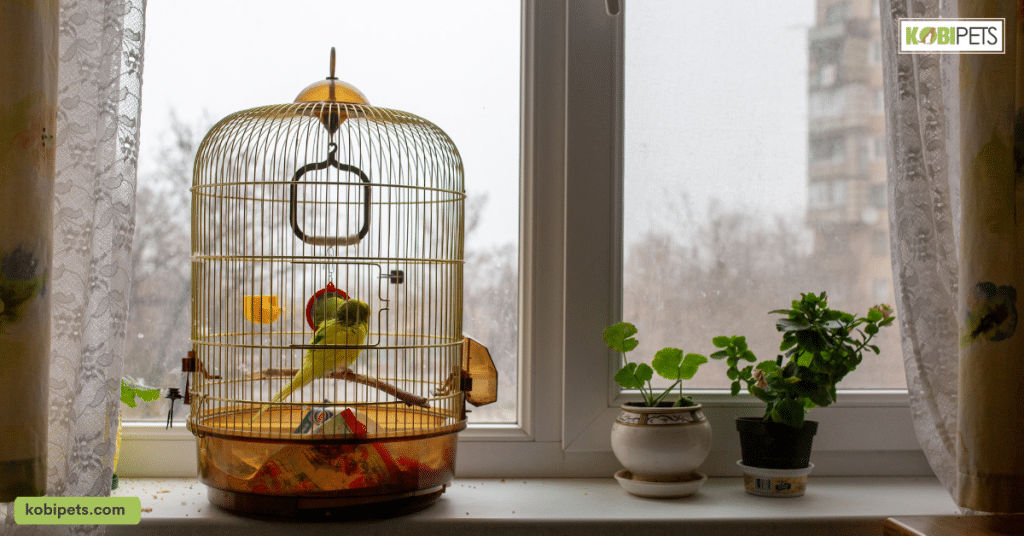
Embracing the Outdoors
Outdoor setups provide your birds with the opportunity to bask in natural sunlight and enjoy the fresh air. This environment can promote physical activity and mental stimulation. Yet, it’s vital to consider the local climate and take measures to protect your avian companions from harsh weather conditions.
However, outdoor aviaries require more careful consideration. You must factor in the local climate. Extreme heat or cold can be harmful to your birds, so it’s crucial to provide shade or heating elements as needed. Protecting them from potential predators, including neighborhood cats and birds of prey, is also essential.
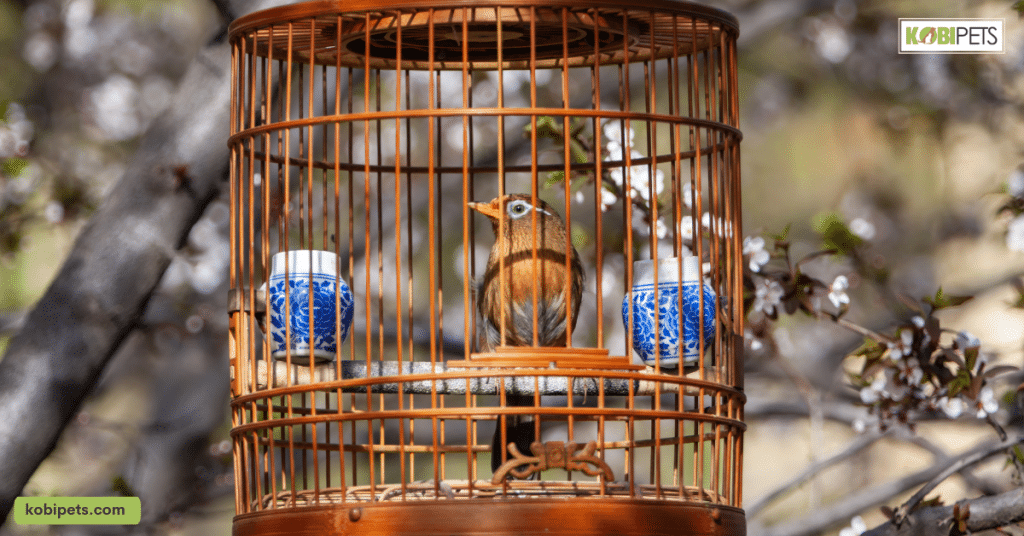
Selecting the Perfect Spot
Choosing the right location within your home or yard is crucial. Ensure the chosen area offers a balance of sunlight and shade throughout the day. Consider temperature fluctuations, making necessary adjustments with heating or cooling devices. Additionally, factor in noise levels, as excessive noise can cause stress to your feathered friends.
The location of your bird’s aviary or cage is a decision that profoundly influences their quality of life. By weighing the advantages of indoor and outdoor setups and meticulously considering factors like temperature, sunlight, and noise levels, you can create an environment where your birds thrive and flourish.
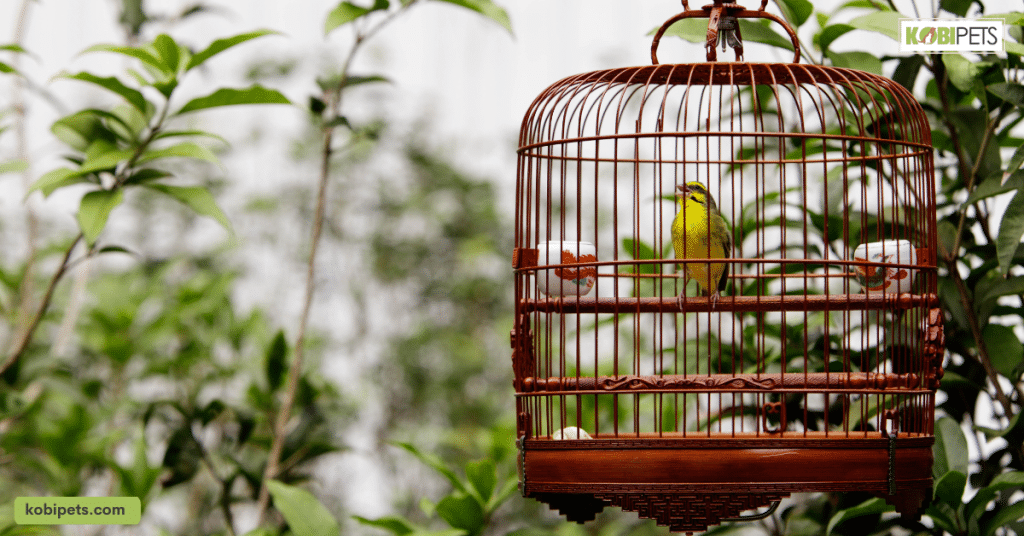
Designing the Aviary or Cage
When designing an aviary or cage for your birds, several key principles should guide your efforts. These principles focus on creating a comfortable and stimulating living space that promotes your feathered friends’ physical and mental well-being.
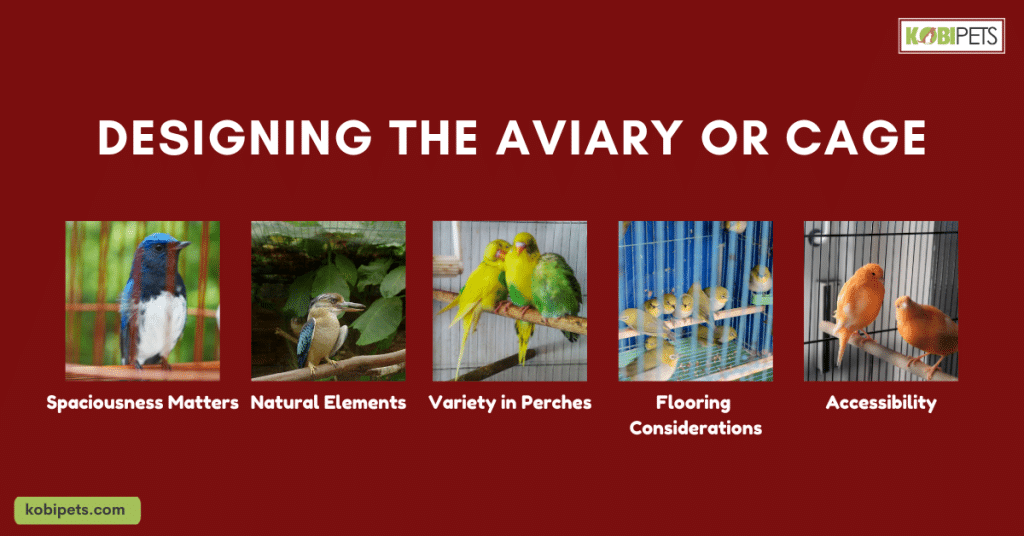
Designing the Aviary or Cage
- Spaciousness Matters: Ensure adequate space in the aviary or cage for your birds to move freely, spread their wings, and engage in natural behaviors, tailored to their species and size.
- Natural Elements: Incorporate branches, perches, and foliage to mimic their natural environment, offering exercise opportunities and mental stimulation.
- Variety in Perches: Diverse perch options with different diameters and textures maintain foot health and create an engaging environment.
- Flooring Considerations: Choose easy-to-clean flooring materials that ensure hygiene and prevent foot injuries, avoiding wire mesh flooring.
- Accessibility: Design doors or openings for easy access, simplifying cleaning, feeding, and interaction with your birds, while facilitating routine maintenance.
By adhering to these design principles, you can create an aviary or cage that provides a safe and stimulating haven for your feathered companions, enhancing their quality of life. The thoughtful design of their living space ensures they thrive both physically and mentally, fostering their overall well-being.
Mimicking Their Natural Habitat
Creating a habitat that closely mimics a bird’s native environment is a crucial step in ensuring their well-being and reducing stress. Birds are inherently tied to their natural habitats, and replicating these settings can help them feel more at ease in captivity. To achieve this, consider the specific requirements of your bird’s species and tailor the aviary or cage accordingly.
For example, for rainforest-dwelling birds, incorporate lush vegetation and moisture sources to mimic the humid environment. Conversely, for desert-dwelling species, introduce sandy substrate and rocky perches to emulate arid conditions.
Additionally, providing features like water baths, sand baths, and foraging opportunities further enrich their environment, allowing them to engage in natural behaviors and fostering a healthier, happier avian companion.
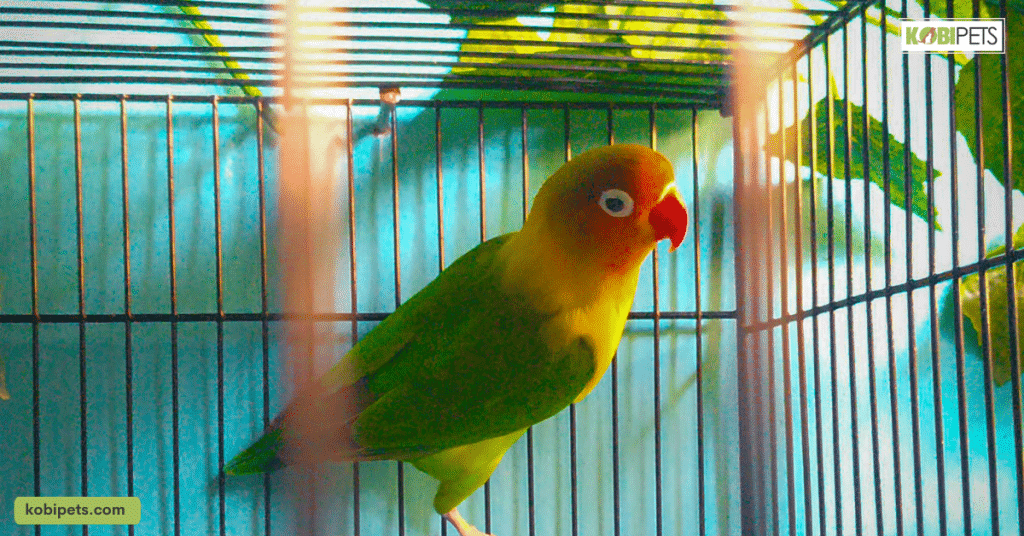
Environmental Enrichment
Providing environmental enrichment is essential for the mental and physical well-being of pet birds. In captivity, birds require stimulation to prevent boredom and ensure they lead fulfilling lives. Toys, puzzles, and interactive activities play a vital role in keeping them engaged and mentally active.
Consider offering a variety of toys that encourage exploration, problem-solving, and physical activity. Puzzle feeders and foraging toys are excellent choices to challenge their intellect and promote natural foraging behaviors. Equally important is the role of social interaction and companionship.
Birds are highly social creatures and interaction with their human caregivers or fellow avian companions is vital for their emotional health. Spending quality time with your birds through talking, playing, or training sessions can greatly contribute to their overall well-being, ensuring they live happy, enriched lives in captivity.
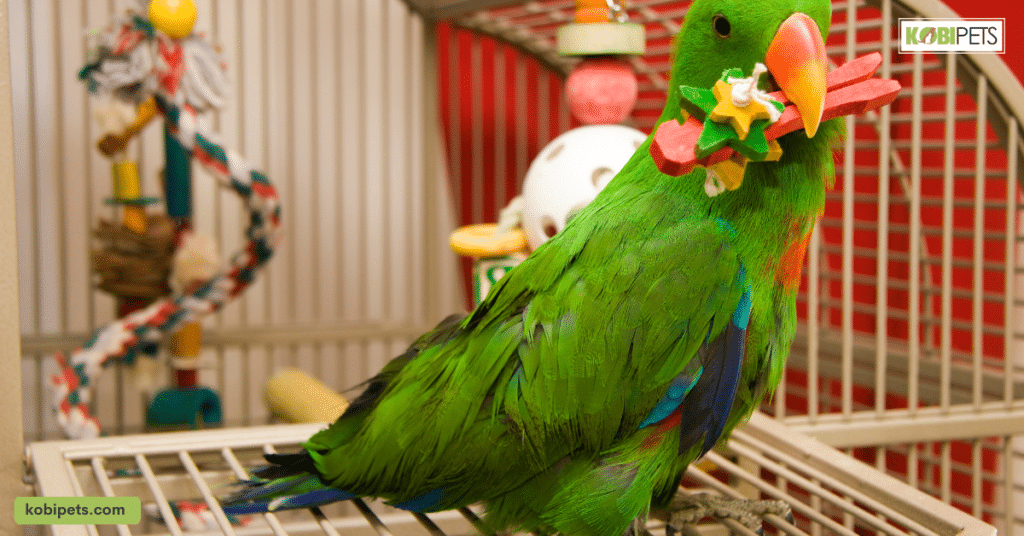
Maintenance and Care
Maintaining your bird’s aviary or cage is pivotal for their health and happiness. Regular upkeep ensures a clean, safe, and stimulating environment. In this section, we’ll delve into the significance of routine maintenance, provide a practical checklist for daily, weekly, and monthly tasks, and share valuable insights on monitoring your bird’s health within their enclosure.
- Daily Tasks: Include cleaning food and water dishes, removing droppings, and providing fresh sustenance.
- Weekly Tasks: Focus on changing or cleaning the bedding, sanitizing perches and toys, and conducting a visual enclosure inspection.
- Monthly Tasks: Perform a comprehensive cleaning, disinfect surfaces, check for structural issues, and address any wear and tear.
- Observation: Regularly observe your bird for changes in behavior, appearance, or appetite, which can signal health concerns.
- Veterinary Care: Schedule routine visits to an avian veterinarian for checkups, vaccinations, and professional guidance on your bird’s well-being.
Regular maintenance and attentive care of your bird’s living space are integral to responsible bird ownership. A well-maintained habitat ensures a clean, safe, and enjoyable environment for your feathered companion, ultimately contributing to their overall health and happiness.
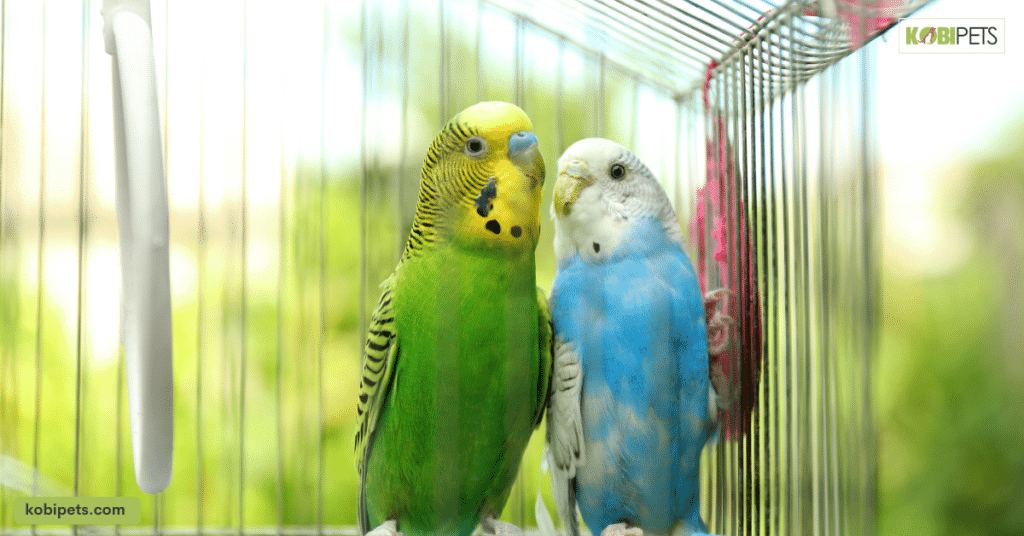
In conclusion
Designing and maintaining the ideal aviary or cage for your pet birds is a labor of love that directly impacts their well-being. By following the principles of design, incorporating natural elements, and ensuring cleanliness and health monitoring, you create an environment where your feathered companions thrive.
These efforts not only enhance their physical and mental health but also deepen the bond between you and your avian friends. Remember that, as their caretaker, you have the power to provide them with a bird paradise they’ll cherish.






